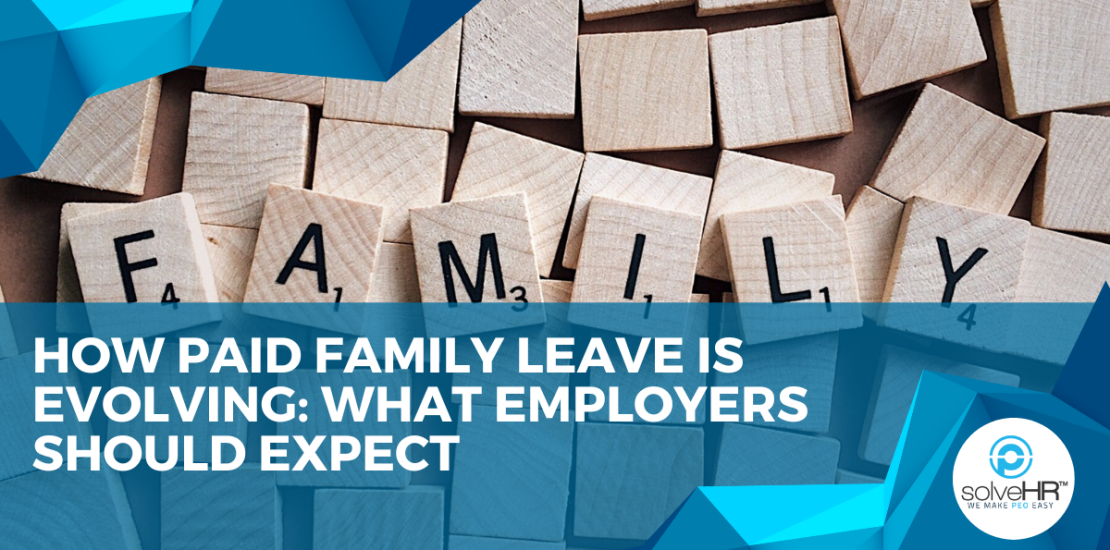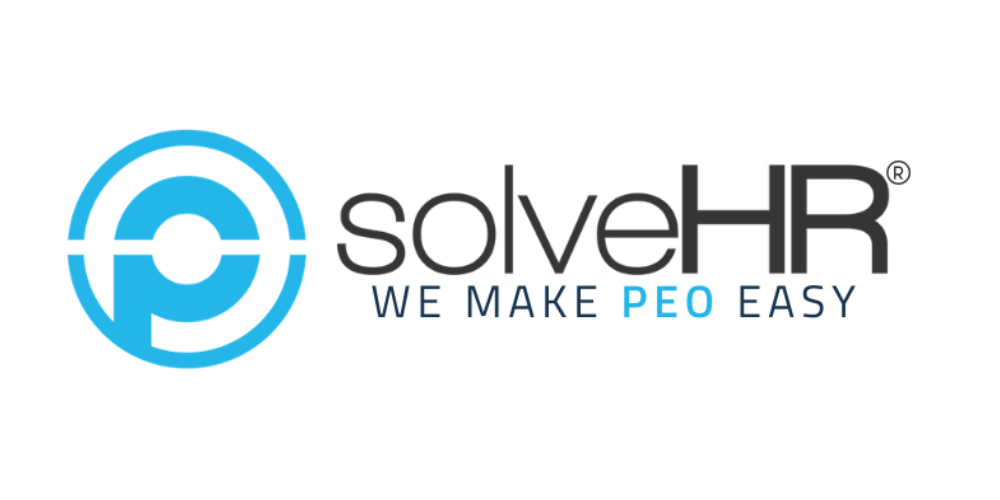How Paid Family Leave is Evolving: What Employers Should Expect
- 07/23/2025
- Posted by: Matt Muriel
- Category: Uncategorized

As the workforce evolves, so do policies that support employee well-being and work-life balance. Paid family leave (PFL) has become a focal point for legislators and employers alike, with many states expanding or enacting paid leave laws that accommodate employees’ personal and family needs. For businesses, understanding how PFL policies are changing and preparing for compliance is crucial. SolveHR is here to help employers navigate these changes and foster a supportive work environment.
Why Paid Family Leave is Important
Paid family leave offers employees the flexibility to care for new children, family members, or their own health needs without sacrificing income. Companies that provide robust PFL policies report benefits such as improved employee satisfaction, reduced turnover, and a more positive workplace culture. However, new regulations are changing the expectations around PFL, making it essential for businesses to keep their policies up-to-date.
Key Trends in Paid Family Leave for 2025
- Expansion of PFL Across States
- What’s Changing: Several states have recently passed or expanded paid family leave laws, with more expected to follow. These changes often include lengthened leave periods, expanded eligibility criteria, and increased benefits.
- How It Impacts Businesses: Employers operating in multiple states need to keep track of different PFL requirements and adapt their policies accordingly.
- SolveHR Tip: Review the PFL requirements in the states where you operate, and consider standardizing your leave policies where possible to simplify compliance. SolveHR can assist with updating your leave policies for state-specific regulations.
- Increased Duration of Paid Leave
- What’s Changing: Many new PFL laws are extending the duration of paid leave, allowing employees more time to bond with family or recover from illness. Some states are offering up to 12 weeks of paid leave, while others are discussing increases to as much as 16 weeks.
- How It Impacts Businesses: Longer leave durations can impact staffing needs, especially in small or mid-sized companies. Employers may need to develop strategies for covering extended absences.
- SolveHR Tip: Create a coverage plan to minimize disruptions during employees’ extended leaves. SolveHR can help identify temporary staffing solutions to ensure continuity during these periods.
- Broadened Eligibility for Paid Leave
- What’s Changing: Eligibility for PFL has expanded in some states to include part-time and contract workers, as well as those with shorter tenure. This inclusivity aims to extend benefits to a wider array of employees.
- How It Impacts Businesses: Employers may need to revise policies and payroll systems to track PFL for more employees, which may increase administrative demands.
- SolveHR Tip: Update your eligibility criteria and payroll systems to accurately track leave entitlements. SolveHR can provide guidance on managing leave for a diverse workforce.
- Employer and Employee Contribution Adjustments
- What’s Changing: Some states fund PFL programs through payroll taxes shared by employers and employees. In 2025, several states are increasing contribution rates to fund expanded programs, affecting payroll deductions.
- How It Impacts Businesses: Changes to contribution rates may require payroll system adjustments to ensure compliance with new withholding requirements.
- SolveHR Tip: Make necessary updates to payroll software to accommodate PFL contributions. SolveHR can assist with managing payroll adjustments and staying compliant with state-specific requirements.
- Inclusion of More Family Member Definitions
- What’s Changing: Some new PFL laws are broadening the definition of “family,” allowing employees to take paid leave to care for not only immediate family but also extended family or chosen family members.
- How It Impacts Businesses: Expanded definitions may result in more employees taking PFL, which may require adjustments in tracking and planning for coverage.
- SolveHR Tip: Update your PFL policy language to reflect the expanded family definitions in your state. SolveHR can help craft policies that are inclusive and compliant with the latest laws.
Preparing for Changes in Paid Family Leave
- Audit Your Current PFL Policies
- Why It Helps: Conducting a policy audit ensures that your current practices align with the latest state and federal requirements. It’s a proactive way to identify any gaps or areas needing updates.
- SolveHR Tip: Schedule a PFL policy review with SolveHR to ensure your policies are compliant and align with best practices. We can recommend adjustments based on your industry and state regulations.
- Update Employee Handbooks and Communication Materials
- Why It Helps: Clear communication of PFL policies allows employees to understand their rights and expectations around leave. An updated handbook reduces confusion and minimizes misunderstandings.
- SolveHR Tip: Revise your employee handbook to reflect new PFL policies, and share updates with your team. SolveHR can assist with drafting and distributing handbook updates.
- Train HR Teams and Managers on PFL Changes
- Why It Helps: Training HR personnel and managers helps ensure that leave requests are handled consistently and fairly, and that employees receive accurate information on their leave options.
- SolveHR Tip: Schedule a training session with SolveHR to cover the latest PFL regulations and best practices for managing leave. Our experts can provide resources to help your team navigate evolving policies.
- Plan for Workforce Coverage and Absence Management
- Why It Helps: Extended and expanded PFL can impact staffing and productivity, so having a plan for coverage is essential.
- SolveHR Tip: Develop a contingency plan for extended absences to ensure that your business operations run smoothly. SolveHR can assist with temporary staffing solutions to fill gaps created by PFL.
- Consult with Compliance Experts on PFL Regulations
- Why It Helps: Consulting with compliance experts can help ensure your business meets all legal requirements while offering a competitive PFL policy that attracts and retains talent.
- SolveHR Tip: Partner with SolveHR to receive tailored advice and support for your PFL policies. We stay updated on the latest regulations and provide resources to keep your business compliant.
How SolveHR Supports Your PFL Compliance Efforts
SolveHR specializes in helping businesses navigate PFL compliance, offering comprehensive support with policy reviews, compliance audits, training, and tailored solutions for multi-state employers. We keep up with regulatory changes, helping you implement effective PFL policies that protect your business and benefit your workforce.
Conclusion
With the rapid evolution of paid family leave laws, businesses must be proactive in staying compliant and supportive of employees’ needs. Understanding upcoming changes and adjusting policies accordingly can help your business maintain compliance, attract top talent, and foster a positive workplace culture. Contact SolveHR today to discuss how we can support your business with PFL compliance and more.

